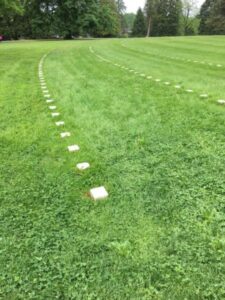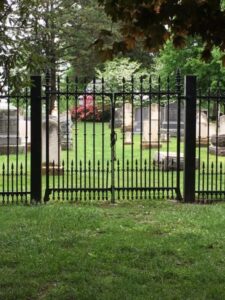Memorial Day
 I’m jumping out of sequence here on my Civil War travelogue, partly because of Memorial Day and partly because of a recent trip to Gettysburg.
I’m jumping out of sequence here on my Civil War travelogue, partly because of Memorial Day and partly because of a recent trip to Gettysburg.
Did you know that Memorial Day was first observed (not celebrated) in 1868, just three years after the Civil War ended? It was intended as a day to remember and honor the 620,000 soldiers who gave their lives in the War Between the States.
620,000.
Today, that would be akin to wiping out every citizen of Baltimore. Or Milwaukee. Or Albuquerque. For that number, you could take out the city of St. Louis twice. Or Pittsburgh. The idea of losing that many husbands, fathers, sons, brothers is staggering. Add up the number of lives lost in all other U.S. wars put together and the Civil War toll is only 24,000 less!
As I stood among the graves of those who died there at Gettysburg and looked out on the fields where they fell, Lincoln’s Gettysburg address took on a deeper meaning than I’d ever imagined.

“Four score and seven years ago, our fathers brought forth on this continent a new nation, conceived in Liberty and dedicated to the proposition that all men are created equal.
Now we are engaged in a great civil war, testing whether that nation, or any nation so conceived and so dedicated, can long endure. We are met on a great battlefield of that war. We have come to dedicate a portion of that field as a final resting place for those who here gave their lives that that nation might live. It is altogether fitting and proper that we should do this.
But in a larger sense, we can not dedicate–we cannot consecrate–we cannot hallow this ground. The brave men, living and dead, who struggled here, have consecrated it far above our poor power to add or detract. The world will little note, nor long remember what we say here, but it can never forget what they did here. It is for us, the living, here rather to be dedicated to the unfinished work which they who fought here have thus far so nobly advanced. It is rather for us to be here dedicated to the great task remaining before us–that from these honored dead we take increased devotion to that cause for which they gave the last full measure of devotion–that we here highly resolve that these dead shall not have died in vain–that this nation, under God, shall have a new birth of freedom–and that government of the people, by the people, and for the people shall not perish from the earth.”
Memorial Day was never meant to be a celebration, though in modern times we’ve turned it into the summer kick off. Yet there are still so many lessons to be learned from the Civil War if we’d only take the time to investigate.
What Have We Learned Since Then?
While at the Gettysburg Military Park, we took in a couple of park ranger talks that were very enlightening. One ranger told the story of Edward Everett, the featured speaker at the dedication of Gettysburg National Cemetery. Everett was a gifted man who, among other things, served as U.S. Representative, U.S. Senator, U.S. Secretary of State, Governor of Massachusetts, and president of Harvard University. At the dedication, he spoke of the war, the cost in human lives and suffering, and the necessity for such a cemetery. As the featured speaker, he spoke for 2 hours prior to President Lincoln giving his two-minute address. The park ranger told of Everett’s opposition to slavery and his commendation of a northern preacher who gave a rousing sermon against slavery. But then, Everett observed, the man smoked tobacco, ate rice, wore cotton clothing, and put sugar in his coffee–all crops that required slaves for harvesting. Giving lip service to a cause is much easier than making the sacrifices necessary to accomplish that cause.
I was convicted by how little our attitudes have changed since then. Today, we rail against sweatshops and factories overseas that require women and children to work ridiculously long days under dangerous conditions for very little pay. But then we demand the low-priced clothing, the athletic shoes, and other items made by those modern day slaves.
“The world will little note, nor long remember what we say here, but it can never forget what they did here.”
Another park ranger described the events of the second day of battles at Gettysburg. Atop the hill called Little Round Top, he

pointed out a statue erected to Gouvernour Warren, a Union general who found the hill unoccupied and diverted troops there approximately fifteen minutes before the Confederates would have claimed it. Very likely, his action changed the outcome of the battle for Gettysburg. The park’s statues and monuments were erected within twenty years of the end of the Civil War to commemorate those whom survivors thought should be remembered for their courage and leadership. Yet today, more than a hundred years later, few know the name of Gouvernour Warren or the reason for his statue.
The ranger concluded by observing that 100 years from now, we have no idea what will be remembered and talked about. But he gave this poignant admonition.
“Fall in love with the history of your country. Some of it is ugly. But we have over 200 years of a pretty special history.”
Now that the weekend is over, may I suggest that you consider observing May 30th, Memorial Day, the way it was meant to be remembered. Take a walk through a cemetery and note the graves of those who served in the military. Most should still have flags near the headstone. Stop a moment and give silent thanks for those who gave their lives so that we could enjoy the gift of freedom.

